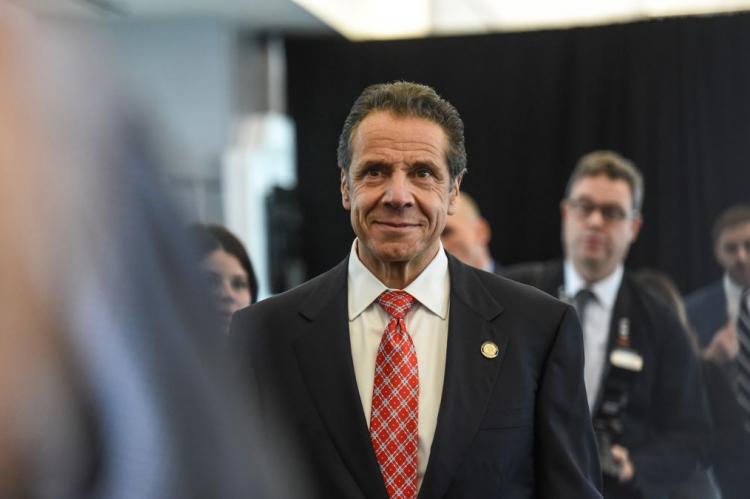Debate rages over Cuomo's tax plan for legalizing marijuana in New York
Marijuana could become legal in New York this year, but the form that legislation takes has yet to be determined.
Gov. Andrew Cuomo is “all in on this. He wants to get this done,” said Darren “Hal” McCabe, executive director of the Legislative Commission on Rural Resources and mayor of the village of Homer. “He likes to be first, and he likes to lead. So I’m very confident that it’s going to get done this year, but I’m not sure what form it’s going to be in.”
McCabe worries that the governor’s proposal, in its current form, would enable large companies to corner the market.
“We do not want this to become big corporate Budweiser or Miller as far as the choices go,” McCabe said. However, if significant changes aren’t made to Cuomo’s proposal, “that’s what’s going to happen,” he said.
The concerns of McCabe, and those of the commission he leads, are contained in a Feb. 5 policy memo to the members of the state Senate and Assembly to get them to incorporate changes in their bills. Assembly Member Barbara Lifton (D-Ithaca) is a co-sponsor of the bill in that house.
The tax scheme is one of main things in need of overhaul, he said.
“The tax at the cultivator level will price smaller farms out of the market,” according to the Feb. 5 memo. Moreover, the effective tax for consumers will be 55% — “the highest in the nation by far, which will lead to an expansion of the black market.”
The commission recommends changing the proposed tax structure, in part by allowing municipalities with dispensaries to charge impact fees of 1 to 3% of the total sale “to cover increased costs (i.e. police, traffic, parking).”
According to the commission, Cuomo’s proposal would put a heavy tax burden on small growers, who would be crushed if the product price were to drop significantly. Instead of taxing the farmer, “the taxes ought to come on the end of the sale,” McCabe said.
But Norman Birenbaum, director of the state’s cannabis programs, said the commission conclusion is based on “flawed analysis.”
“We believe that their analysis did not fully understand the proposal,” he said.
The effective tax rate, he argued, is about 20%, which would put New York in line with Maine, Massachusetts and Connecticut.
Birenbaum also took issue with the municipal impact fee proposal, saying the governor’s tax structure would already route about 2% of the total collected tax back to municipalities.
Cuomo’s executive budget estimates legalized marijuana would generate $20 million in taxes destined for a cannabis revenue fund in fiscal year 2021 and $63 million in fiscal year 2022.
McCabe, however, said this might not pan out if other changes aren’t made. One is the number of licenses issued. McCabe said Oregon ran into problems with this. Because the number of licenses wasn’t restricted, first year of legalization saw massive overproduction, which in turn collapsed the sale price and led to marijuana being sold on the black market, according to the memo.
Birenbaum, however, said that the governor’s proposal takes these possibilities into account by allowing the state to set production caps.
“This is absolutely a best practice that we’ve seen other states adopt, and it’s contained in the governor’s proposal,” he said.
Cuomo’s proposal also calls for the creation of a five-member Cannabis Control Board, which would oversee a new Office of Cannabis Management, “an independent entity within the division of Alcoholic Beverage Control,” according to the memo.
The commission recommends that the members of the board be appointed by the legislature, and not by the governor, as Cuomo has proposed.
Birenbaum said Cuomo’s proposal this year already marks a change from last year’s proposal, since he is now calling for a five-member board, as opposed to a single executive director or commissioner.
The Legislative Commission on Rural Resources also does not want this board to be able to offer licenses or regulatory exemptions. It would, however, allow for licensing for full vertical integration, in which one company controls the entire supply chain, for an additional fee.
Finally, the commission also opposes allowing counties and cities with populations greater than 100,000 to opt out of legalization, as Cuomo’s proposal now allows.
“This unfairly punishes cities, towns, and villages, as well as all taxpayers within that county,” states the memo, which recommends giving smaller municipalities — not counties and big cities — the ability to opt out through public referendum.
Birenbaum said the governor’s office is willing to work with the legislature on this issue.
“We’re open to speaking to the legislature if they think there’s a better way of offering municipal control over how licenses can be allocated,” he said.
He noted, however, that other states that have allowed municipal opt out — he cited Colorado and Massachusetts — have seen a delay in the state roll-out of legislation as municipalities grappled with whether to participate. Those states also saw efforts by outside groups and companies to influence local decision-making — a level of attention that can be overwhelming for municipalities, he said.
Instead, the governor’s office would rather “defer to a local ordinance or law” set by a county or city, Birenbaum said.
- Log in to post comments

